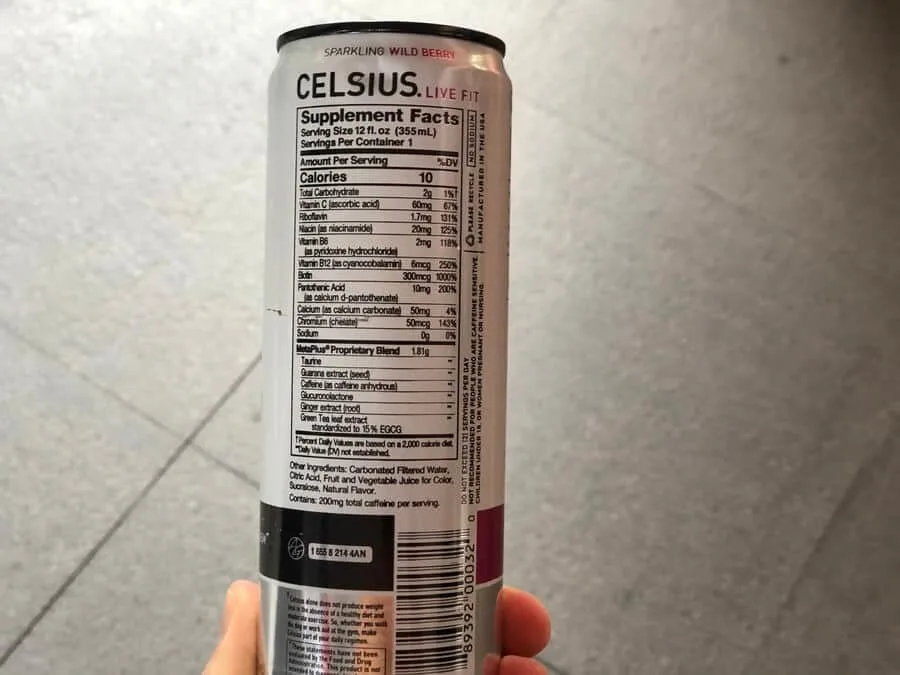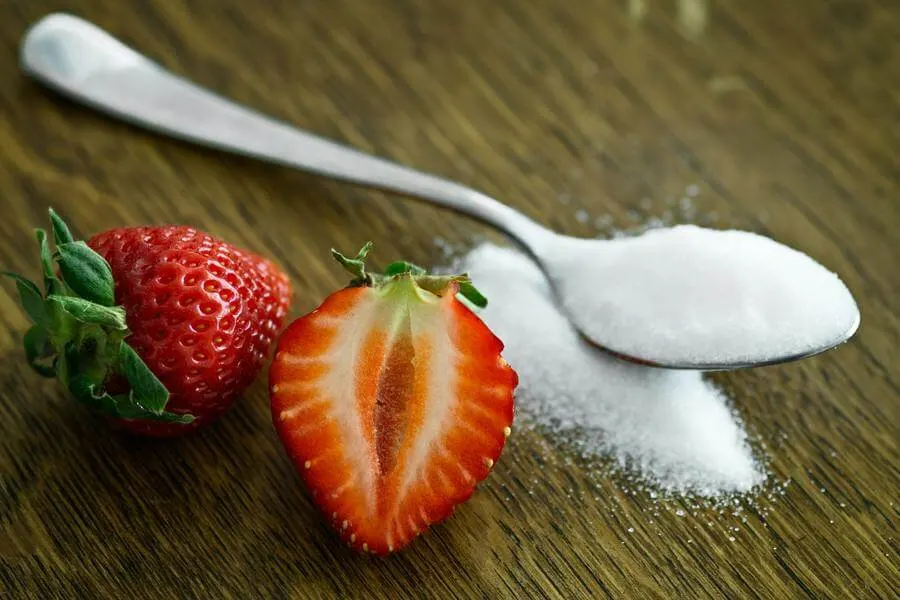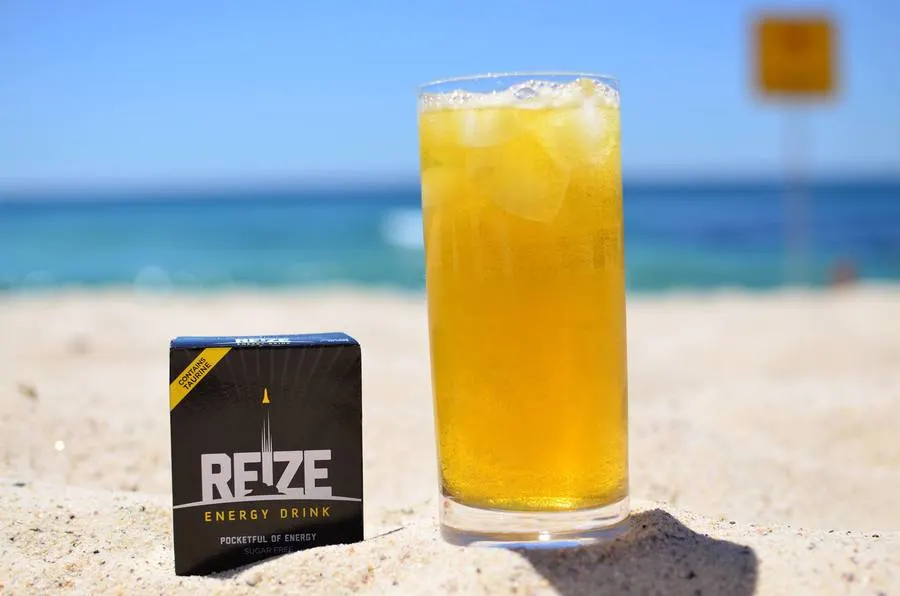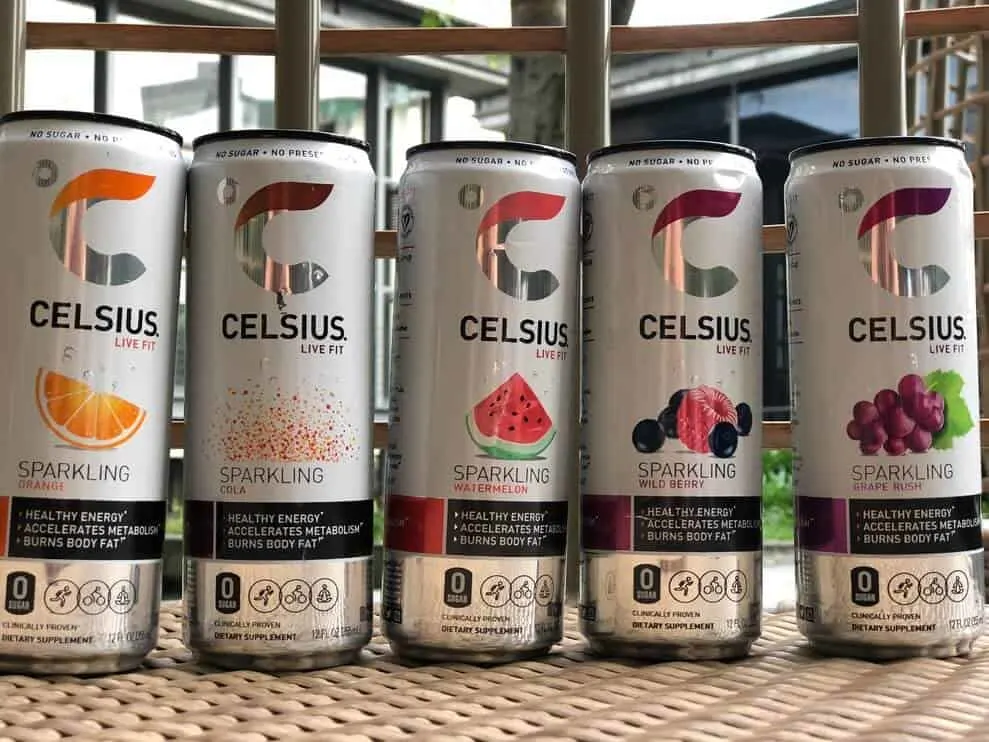Celsius Energy is one of the most popular energy drink brands in the US, with several product lines to its name.
It’s even a publicly listed company, trading on the Nasdaq as “CELH“.
With a wide selection of flavors and nutritious ingredients, Celsius Energy strives to provide your energy needs with a healthy touch.
However, what exactly is Celsius made of, and is it really as healthy as it’s portrayed to be?
A 12 fl. oz can of Celsius Original contains 200mg of caffeine, 10 calories, and is sugar-free with a generous serving of vitamins and minerals. The brand overall aims to aid in burning calories during workouts by stimulating thermogenesis in your body.
For a more detailed discussion on the nutrition facts of Celsius energy drinks, read on to learn more about each Celsius variety, from its ingredients to whether it’s actually good for you or not.
Let’s get started…
Celsius Energy Drink Ingredients

The Celsius energy drink brand has four different product lines:
- Original (signature Celsius series, includes both carbonated and non-carbonated versions)
- Sweetened with Stevia (naturally sweetened and caffeinated, sparkling varieties available)
- On-The-Go (powdered energy drinks)
- HEAT (has a higher dose of caffeine)
Here’s the list of ingredients for each of the Celsius product varieties:
Celsius Originals (12 fl. oz)
- 200mg caffeine
- 60mg of vitamin C
- 1.7mg riboflavin (vitamin B2)
- 20mg niacin (vitamin B3)
- 10mg pantothenic acid (vitamin B5)
- 2mg pyridoxine (vitamin B6)
- 300mcg biotin (vitamin B7)
- 6mcg cobalamin (vitamin B12)
- 50mcg chromium
- 50mg calcium
- Carbonated water
- Citric acid
- Fruit & vegetable juices
- Sucralose
- Natural flavor
Celsius Naturals (12 fl. oz)
- 200mg caffeine
- 2g dietary fiber
- 60mg of vitamin C
- 1.7mg riboflavin (vitamin B2)
- 20mg niacin (vitamin B3)
- 10mg pantothenic acid (vitamin B5)
- 2mg pyridoxine (vitamin B6)
- 300mcg biotin (vitamin B7)
- 6mcg cobalamin (vitamin B12)
- 51mg calcium
- 50mcg chromium
- 5mg sodium
- Carbonated water
- Erythritol
- Citric acid
- Natural flavor
- Stevia Rabaudiana leaf extract
- Vegetable juice (for color)
Celsius On-the-Go (5.9g powder sachet)
- 200mg caffeine
- 60mg of vitamin C
- 1.7mg riboflavin (vitamin B2)
- 20mg niacin (vitamin B3)
- 10mg pantothenic acid (vitamin B5)
- 2mg pyridoxine (vitamin B6)
- 300mcg biotin (vitamin B7)
- 6mcg cobalamin (vitamin B12)
- 50mg calcium
- 50mcg chromium
- Citric acid
- Natural flavor
- Sodium bicarbonate
- Sucralose
- Erythritol
- Annato
- Silicon dioxide
Celsius Heat (12 fl. oz)
- 300mg caffeine
- 60mg of vitamin C
- 1.7mg riboflavin (vitamin B2)
- 20mg niacin (vitamin B3)
- 10mg pantothenic acid (vitamin B5)
- 2mg pyridoxine (vitamin B6)
- 300mcg biotin (vitamin B7)
- 6mcg cobalamin (vitamin B12)
- 50mg calcium
- 50mcg chromium
- 2g citrulline
- Carbonated water
- Citric acid
- Natural flavor
- Fruit and vegetable juice
- Sucralose
These four energy drink product lines under Celsius also contain a proprietary energy blend called the Celsius Metaplus blend (1.81g) which consists of:
- Taurine
- Guarana
- Caffeine
- Glucuronolactone
- Ginger extract
- Green tea extract
How Many Calories Are In Celsius Energy Drinks?
Generally, Celsius energy drinks contain between 10 to 15 calories per serving.
Celsius Original has 10 calories while Celsius Stevia and Celsius Heat both have 15 calories per can. All in all, Celsius products are low-calorie and suitable for most diets.
Considering that the recommended daily calorie intake is 2000 to 2400 calories for women and 2400 to 3000 calories for men, Celsius Energy has a pretty small amount of calories for an energy drink of its size.
The upside of Celsius’ modest calorie content is that your daily calorie count won’t be significantly affected by it, which is great if you’re on a diet.
However, this doesn’t mean you should substitute your meals with Celsius as energy drinks aren’t supposed to replace a filling and nutritious meal, so if you do feel hungry, you should grab something to eat instead of having another can of Celsius Energy.
If you’d rather do away with calories completely, feel free to check out my article about the best zero-calorie energy drinks, where you can find some good alternatives.
How Much Caffeine Is In A Celsius Live Fit Drink?
Celsius Live Fit Energy drink contains 200mg of caffeine per 12 fl. oz.

Generally, the Celsius Energy product varieties contain between 200mg to 300mg of caffeine per serving.
That’s a lot of caffeine.
Personally, I keep my usual caffeine intake to between 50mg to 100mg per drink.
Everyone’s tolerance to caffeine is different, so it may take you a while to understand what your own personal caffeine limit is. The general guideline according to the FDA is to stick to less than 400mg of caffeine per day for healthy adults.
If you consume more than that, you may experience symptoms like:
- Shakiness and restlessness
- Insomnia
- Headaches
- Dizziness
- Anxiety
- Dehydration
There’s also a warning label on the back of the can of Celsius energy drinks that you shouldn’t exceed two cans of Celsius per day.
The best way to avoid adverse effects is to moderate your consumption of Celsius energy drinks (or any energy drinks for that matter) and stay within the recommended caffeine limits.
Is Celsius Sugar-Free?
Celsius Energy is sugar-free, but it does contain artificial sweeteners and sugar substitutes like sucralose and stevia.
Celsius Originals and Celsius HEAT replace regular sugar with sucralose, while Celsius Naturals and Celsius On-The-Go substitute sugar with Stevia and Erythritol respectively.
Let’s take a closer look at each of these sweeteners.
Sucralose
Sucralose is a zero-calorie sweetener that commonly goes by the brand name ‘Splenda’. As it’s approved by the FDA, it’s used in many of our packaged foods and beverages products.
The purpose of sucralose is to improve the taste of food and drinks since it’s about 400 to 700 times sweeter than sugar. The advantages of sucralose are that it doesn’t lead to cavities over time and helps in weight control too.
Stevia
Stevia is a zero-calorie sweetener that’s processed from the leaf extract of the stevia plant. It’s around 200 times sweeter than regular sugar.
Stevia products found in stores are sometimes mixed with other sweeteners which increase their calorie and carb content, so you might want to watch out for that.
Although stevia is relatively safe for diabetics, Stevia products that contain dextrose or maltodextrin should be avoided.
Erythritol
On the other hand, erythritol is a zero-calorie sugar alcohol that’s commonly used to sweeten or thicken food and beverage products.
The perks of sweeteners are that you can continue to consume sugar-free energy drinks like Celsius without feeling bad and thinking about the number of calories they have.
Still, you shouldn’t consume these sweeteners frequently as there are still a lot of things we don’t know about them so it’s hard to judge if they have any long-term effects on your health.

Celsius Energy Drink Vitamins and Minerals
In my opinion, Celsius Energy contains a generous amount of vitamins and minerals that your body doesn’t necessarily need.
If we were to follow the recommended daily intake given by the FDA and other health authorities, it’s clear that a single can of Celsius provides you more than what’s required. Your body will just end up eliminating these nutrients rather than using them for good.
I’ve listed the comparison of the vitamin and mineral content in Celsius Natural versus the recommended daily intake for easy reference:
| Vitamins/Minerals | Quantity in Celsius Energy Drink | Recommended Daily Intake (RDI) |
| Vitamin C | 60mg | 65mg – 90mg |
| Riboflavin (vitamin B2) | 1.7mg | 1.3 mg (men) 1.1 mg (women) |
| Niacin (vitamin B3) | 20mg | 16 mg (men) 14 mg (women) |
| Pantothenic acid (vitamin B5) | 10mg | 5mg |
| Pyridoxine (vitamin B6) | 2mg | 1.3mg |
| Biotin (vitamin B7) | 300μg | 30μg |
| Cobalamin (vitamin B12) | 6μg | 2.4μg |
| Calcium | 51mg | 1000mg |
| Chromium | 50μg | 35μg (men) 25μg (women) |
For a more insightful opinion of the vitamin and mineral content in Celsius Energy, you can read more about it in this article where I’ve covered the topic in greater detail.
Other Ingredients
Glucuronolactone
Glucuronolactone is a type of chemical that’s typically found in energy drinks for its supposed benefits in improving attention and exercise performance, but there aren’t any concrete studies that have confirmed this yet.
Citrulline
Citrulline is an amino acid that’s commonly found in watermelon. Apparently, taking citrulline in supplementary form can increase athletic performance.
Does Celsius Help You Burn Fat?
Celsius won’t directly burn fat but it can help boost your metabolism and provide you with sufficient energy to aid fat burning and help with weight loss.
One of the benefits of caffeine is that it can provide you with an energy boost that will motivate you to workout for a longer time.
At the same time, caffeine can also increase metabolism and help you burn fat. Caffeine can also suppress your hunger and cravings temporarily.
The important thing to know is that drinking cans of Celsius won’t help you to magically lose weight without you also putting in the hard work by exercising and following a healthy diet.
Celsius is a great choice to help give you a boost to burn off those calories whether at the gym or during a run.
Is Celsius Energy Drink Good For You?
Celsius energy drinks may be good or bad for you depending on your intake but I must say that Celsius is one of the healthier energy drink options out there given its ingredients.
First, let’s take a look at the pros of having Celsius.
Celsius Energy is sugar-free and has a small number of calories, so health-wise I’d say it’s a better choice than some of the other energy drinks out there. Celsius also contains plenty of natural ingredients that’ll provide an extra edge in your performance.
Aside from that, Celsius also has reasonable caffeine content, though leaning towards the higher end of the spectrum. Caffeine is notable for enhancing physical performance based on numerous studies.
Combine all of these aspects together and you get a pretty promising pre-workout drink.
However, Celsius also has its cons.
Celsius’s caffeine content isn’t recommended for everyone as it may cause negative effects if you have a low caffeine metabolism.
Besides that, Celsius contains an excessive amount of vitamins and minerals that may be otherwise ineffective or harmful to you, particularly if you drink Celsius frequently.
In brief, it really boils down to the number of cans of Celsius you usually consume. If you limit your intake to only one can of Celsius per day and drink it occasionally for example when you exercise, then Celsius would be beneficial for you.
For a more in-depth answer on whether Celsius energy drinks are good or bad for you, check out this article I wrote, which may help you decide.
Is CELSIUS energy drink healthy?
Celsius energy drink is advertised as a fitness drink and thus seen by many as healthy. For the most part, it is considered the healthier option among other energy drinks.
The reason why it’s considered healthy is that it contains no sugar or preservatives. It also has many healthy ingredients such as Vitamin B and C, guarana, and ginger root extract.
Celsius Energy is also helpful in working out. It increases heart rate and body temperature, making it much easier to burn off calories and help in losing weight.
Although Celcius still contains high amounts of caffeine that can affect a person’s health. Therefore it is important to still limit consumption it and make it a part of your diet.
Celsius Energy Drink Alternatives
If you’re looking for other energy drink alternatives to switch up your taste buds; here are some wonderful brands you can try:
Powdered energy drinks are also great options as they’re more versatile and affordable. Here are a few awesome brands that you can check out:
- Advocare Spark
- Zipfizz
- G Fuel
- REIZE (my fav)
REIZE (10 Out Of 10)

In my opinion, REIZE is a great alternative to Celsius.
First, REIZE is a great powdered energy drink that comes in convenient 4g sachets, which you can easily slip into your bag or pocket and take anywhere you might need an energy boost.
Plus, REIZE has a sensible 50mg of caffeine, only 11 calories, and is completely sugar-free. Like Celsius, REIZE won’t affect your daily calorie intake but it also spares you the side effects of having too much caffeine, which makes it the better option, especially if your caffeine tolerance is lower.
REIZE also contains a smart blend of great ingredients like taurine, ginseng, and B vitamins that combine together to provide you with the perfect energy boost, without the crash.
And if that’s not enough of a sweet deal for you, REIZE ships straight to your door for only about $1 per drink.
That’s amazing value for money and a lot more affordable than Celsius.
Give REIZE a try and I’m sure you’ll find that REIZE is a smarter option than Celsius.
Other Articles
Have other questions or want to learn more about Celsius? I’ve compiled everything you could possibly want to know about in this epic Celsius energy drink guide.
Besides that, you might also like…

